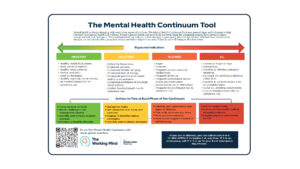I’ve spent years supporting friends and colleagues living with mental illness. I’ve seen the small victories, the quiet struggles, and the moments that can make or break someone’s day. Mental illness isn’t always visible. One day, a co-worker came in with a sprained wrist. Everyone noticed immediately: questions were asked, help was offered, and adjustments were made. I wouldn’t wish a sprained wrist on anyone, but in that moment, I felt a pang of envy, not for the injury itself, but for how easily it was seen and acknowledged. Supporting mental health in the workplace, especially with an invisible challenge is far harder. How can you know? How can someone share it safely? Over time, I’ve learned a few things that make a difference, and here are five I wish more co-workers understood.
1. You Can’t Always See It
Mental illness doesn’t always present in ways we can recognize. A colleague may appear fine outwardly while struggling deeply inside. Understanding that challenges can be invisible is the first step toward empathy and meaningful support.
2. Empathy is About Making Space
Asking “How are you?” is easy, but hearing the answer takes presence. Empathy isn’t about fixing someone or acting as a therapist, it’s about creating space for honesty. People living with mental illness may sometimes not be okay, and it’s equally valid for others to be doing well. Allowing both truths to exist fosters authentic connection.
3. A Person is More Than Their Diagnosis
Supporting someone means seeing the whole person, not just their condition. Many people live in recovery, balancing good days and bad, without hiding their experiences. A mental health diagnosis doesn’t define who someone is. Recognizing that helps break the assumption that people with mental illness are always struggling.
4. Words (and Silence) Matter
Language shapes culture. Off-hand jokes or dismissive comments equating mental health struggles with being ‘crazy’ or ‘unstable’ may seem minor, but they reinforce stigma. Silence can also send a powerful message, suggesting that mental health isn’t safe to talk about. Thoughtful, respectful language, paired with openness, creates an environment where colleagues feel seen and supported.
5. Talking About it Doesn’t Conjure It
There’s a myth that mentioning mental health can somehow cause it or make it worse, like how repeating a name might summon a monster. Depression isn’t Beetlejuice. It doesn’t appear just because you say the word (no matter how many times!) Quite the opposite: talking about it brushes off the stigma that was covering it, taking away its power and making it safer for people to be open. Honest conversations reduce isolation, foster support, and remind everyone that mental health is human, not something to fear or avoid.
Closing
Even as I share these reflections, I know I don’t have it all figured out. I’ve made mistakes, let assumptions guide me, and unintentionally reinforced stigma at times. But the more we show up with empathy, understanding, and humility, the more we strengthen our workplace and our relationships. It’s not about perfection,it’s about trying, learning, and getting a little better every day.


